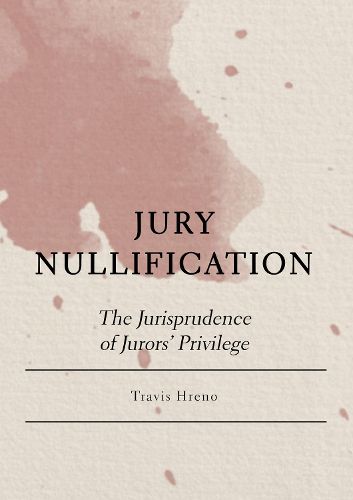Readings Newsletter
Become a Readings Member to make your shopping experience even easier.
Sign in or sign up for free!
You’re not far away from qualifying for FREE standard shipping within Australia
You’ve qualified for FREE standard shipping within Australia
The cart is loading…






This title is printed to order. This book may have been self-published. If so, we cannot guarantee the quality of the content. In the main most books will have gone through the editing process however some may not. We therefore suggest that you be aware of this before ordering this book. If in doubt check either the author or publisher’s details as we are unable to accept any returns unless they are faulty. Please contact us if you have any questions.
Jury nullification, in its simplest definition, occurs when a jury returns a not guilty verdict for a defendant it believes to be legally guilty of the crime charged. To put this explicitly, a jury nullifies when, despite believing both a) that the defendant did, beyond a reasonable doubt, commit the act/omission in question, and b) that such behavior is, in fact, prohibited by law, nevertheless declares the defendant innocent. This book explores the specifically philosophical aspects of the phenomenon. Is jury nullification a right? A power? A mere ability? A privilege? A pernicious form of juror malfeasance? Is a system that allows for jury nullification more, or less just, than one that does not?
This important book fills a gap in the current scholarship around jury nullification, which, for the most part, has been confined to purely doctrinal analyses, rather than the broader ethical, social, political, and philosophical contours of this issue.
$9.00 standard shipping within Australia
FREE standard shipping within Australia for orders over $100.00
Express & International shipping calculated at checkout
This title is printed to order. This book may have been self-published. If so, we cannot guarantee the quality of the content. In the main most books will have gone through the editing process however some may not. We therefore suggest that you be aware of this before ordering this book. If in doubt check either the author or publisher’s details as we are unable to accept any returns unless they are faulty. Please contact us if you have any questions.
Jury nullification, in its simplest definition, occurs when a jury returns a not guilty verdict for a defendant it believes to be legally guilty of the crime charged. To put this explicitly, a jury nullifies when, despite believing both a) that the defendant did, beyond a reasonable doubt, commit the act/omission in question, and b) that such behavior is, in fact, prohibited by law, nevertheless declares the defendant innocent. This book explores the specifically philosophical aspects of the phenomenon. Is jury nullification a right? A power? A mere ability? A privilege? A pernicious form of juror malfeasance? Is a system that allows for jury nullification more, or less just, than one that does not?
This important book fills a gap in the current scholarship around jury nullification, which, for the most part, has been confined to purely doctrinal analyses, rather than the broader ethical, social, political, and philosophical contours of this issue.